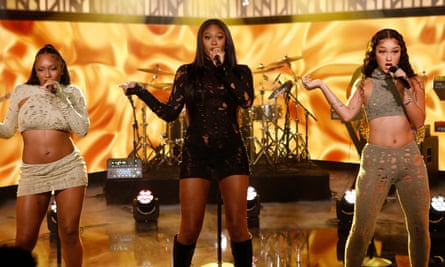Flo arrive at the central London restaurant where our interview is taking place, in this order: first comes 21-year-old Stella Quaresma, arriving before we’ve been shown to our table; then Renée Downer, aged 20, once we’ve been seated but before drinks are ordered; and finally Jorja Douglas, 20, who announces that “the label don’t know how to book a cab!” as she sits down with just enough time to skim the menu and request a cacao smoothie. Their staggered entrances makes the difference between a group of girls and a girl group all the more perceptible; with the important business of what to have for lunch taken care of, the trio shift into a different gear, synchronising as a unit, transforming into Flo.
Barely a year ago, these young women were pretty much anonymous. But then came the release of their debut single Cardboard Box in March 2022. Since then they have clocked more than 35m streams, in excess of half a million followers on social media, sparked a viral TikTok dance trend and impressed audiences with performances on Jimmy Kimmel Live! and Later … With Jools Holland. They open 2023 with the Brits’ rising star award under their belts, and as the first girl group to win the influential BBC Sound Of poll.
A cheer, at a volume respectful of the other diners, goes up around the table when these accolades are mentioned. “It just keeps going!” says Quaresma.
“It’s the moves we wanna be making and the achievements we wanna be accomplishing,” says Downer.
“Especially so early on,” Douglas says. “We’re so fresh, so to win both those accolades in only seven months of releasing music is such a … ” she trails off, lost for words.
“A slay,” says Quaresma.
Pop acts are less likely to come completely out of nowhere these days – new acts often slow-burn on the internet for years before sparking mainstream attention – but Flo seemed to appear overnight. A single tweet, embedded with a clip ripped from the Cardboard Box video, brought them to the attention of the generation who lived through peak-era girl bands – Destiny’s Child, TLC, early Sugababes – and the generation that, like Flo, want to revive that late-90s/early-00s sound. Early fans included Kelly Rowland, Brandy, JoJo and Leigh-Anne from Little Mix, whose support has been seen as a tacit passing of the baton. Their rapid ascent led to accusations that Flo are “industry plants”, an expression that once referred to any manufactured acts marketed as authentic, but is now used as a catch-all term for successful major label signees [Flo are signed to Island Records], especially if the acts – and/or their fans – are women.
The reality is simply that much of the work that has gone into Flo’s preparation for the spotlight has taken place behind the scenes. Douglas, Quaresma and Downer were individually scouted by their manager, among 40 to 50 young singers invited to audition. All three members harboured musical ambitions from a young age: Londoners Quaresma and Downer were students a year apart at Sylvia Young theatre school while Douglas (born in Germany, but raised in Hertfordshire) won the CBBC talent show Got What It Takes? when she was 14 years old. All three knew of one another from social media, and when they finally got together in person for the first time, later in the audition process, it was clear the stars had aligned.
Three years of development followed. Things fell into place fairly quickly when they went into the studio with producer and songwriter MNEK, who has written smash hits for everyone from Beyoncé to Dua Lipa. Their early sessions produced Cardboard Box, and they have worked almost exclusively with him ever since. MNEK’s own affinity for 90s R&B and hip-hop meshes perfectly with Flo’s collective taste and they are unafraid to make explicit reference to the well of inspiration they draw the most from: the early-00s era of R&B songwriting moulded by producers like Darkchild, Timbaland and Kandi Burruss.
The girls are all credited songwriters, “dramatising [their] own personal experiences” for songs such as Immature, Not My Job and recent single Losing You. They have established a core brand of “no scrubs” girl power – “standing up for yourself, independence, being confident in yourself so no one has the opportunity to treat you differently because you’re a woman,” says Quaresma – but MNEK’s role has been crucial to their ascent.
“Obviously there’s collaboration,” says Douglas. “But he vocally produces and vocally arranges all of our stuff. Ad-libs, lyrics, production, all those harmonies, the whole thing. And he brings out the best in our lyricism and our artistry. We’re his students.”
“He’s the fourth invisible member,” says Quaresma.
Flo are much less enamoured with the idea of there being an invisible fifth member: TikTok. One of their unreleased tracks, an impossibly catchy anthem inspired by Spice Girls’ Holler and seemingly primed for that platform, has become a matter of contention for that very reason. “That’s not coming out!” Douglas says moodily. Chasing social media trends is not high on their to-do list.
“TikTok is the platform of our generation, and that’s great, but you have to find a balance with it,” says Downer. “A lot of artists get defined as TikTok artists, but that’s absolutely not what we want to be a part of.
It helps that Douglas, Quaresma and Downer are their own target market, and have far more of an understanding of what is going to work for their audience and what isn’t than their label, who the girls say are primarily concerned with “what the numbers dictate”. Naturally, this has caused tension.
“The initial conflict was when it came to releasing music,” says Downer. “We really wanted Cardboard Box to be the lead single, but the label wanted to go in with what they know best and what they were experienced with.” The band ended up making a PowerPoint presentation in support of their stance, and won the argument. “Obviously Cardboard Box has done what it needed to do, so it’s no longer an issue … ” Downer continues.
“In terms of music, there’s no resistance,” Douglas interjects. “We don’t get pushback on picking songs any more. But picking the song is only the beginning of the story. Everything else that comes with it is just … a nightmare, to be honest. It can really suck the fun out of a release.”

On the flipside, this uniting against a common enemy has strengthened the bond between the trio, which is the secret, they say, to a successful girl group. “You have to genuinely like each other, or it’s not gonna work,” says Downer. At times they seem like sisters, with sentence-finishing skills and matching tattoos to prove it. Downer, sweet and measured, occupies the roles of both the “annoying” baby of the group, and the organised mum figure. Douglas has a dramatic flair and self-describes as “bossy, and synonyms of”, which the other girls translate as “strong” and “switched-on”. Quaresma, who appears to be paying the least attention but never misses the window for a well-timed zinger, is the peacemaker according to Downer, and thinks of herself as chill. “I said witty,” Jorja tells her. “I know you did,” says Quaresma, with a proud smile.
Their similar upbringings – they were all raised by single mothers – have also played a part in their motivation. “We’ve seen it growing up. I saw my mum sweat to send me to private school by herself, and now we’ve made something of ourselves off the back of our mums’ hard work,” says Downer. “We can do anything.” It’s why the “industry plant” accusations rankle. “Coming in as a girl group – a Black girl group – we have to kick the door down. We can’t afford to be half-arsed,” says Douglas.
All being well, the next year will be obstacle-free. Work will soon begin on their debut album, and in the meantime they have a big collaboration planned for their next single, which will drop before they play two sold-out UK shows in London and Manchester. They also have further, as yet unannounced, tour dates to prepare for “if we get enough rehearsal time,” Douglas says.
As it stands, in fact, there is really only one thing standing in the way of Flo’s total cultural dominance over the next 12 months: the Flo app. At the time of writing, not only does typing the group’s name into Google return results for the ovulation calendar that helps women track their menstruation cycle, these results are higher in the search rankings than they are. Do either of these things bother them?
“I mean, there’s nothing wrong with periods,” they all shrug.
“We’re gonna be bigger than periods,” adds Quaresma.
Losing You is out now.

